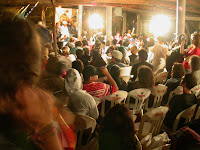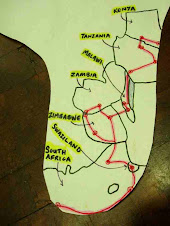STRATEGY: Listening tour!!

Very briefly, the Zapatistas work to create local economic and social systems in response to the oppressive nature of neoliberalization. They have worked for decades to build local health, education and political 
The Other Campaign is a brilliant strategy of grassroots mobilization. The Zapatistas are basically on a “listening tour,” moving from state to state calling together indigenous people and other activists to share their grievances, concerns, traditions and ideas with each other. The Zappies are the sparks and the threads from place to place.
I met them in Magdalena, in the State of Sonora, Mexico. During the weekend event, we listened to dozens of people speak their truths, and I was completely enthralled for hours and hours!
Click here for my story and photos of my adventure with the Zapatistas!
We arrived at the eco-hostel ranch in Magdalena at about 3pm on Saturday, joining the other carloads of eager young activists from Tucson. Little by little, locals and nearby indigenous communities began to arrive.
On the other side of the central dirt area, where a few men from the Tohono O’odham tribe were starting a ceremonial fire, was a covered pavilion with many rows of plastic Tecate-sponsored chairs facing a long table in front. Next to the pavilion were some very noisy goats.
The conversation revolved around the concept of changing ourselves before we can change the world -- a great start to a sacred weekend. This was a reminder to me about my own path, my own journey as an organizer and as a Saturn-returning woman. This is an essence of my personal struggle: to find my own sense of personal peace (including things like taking care of my body – he told me I should do a cleanse and clean my skin thoroughly, and I agree!) in the midst of my work as an activist. This is all of our struggles, no? So, to invoke this concept – that it starts with myself – at the beginning of this weekend, was quite apropos. Also, one year ago that day I began my three-month ritual for turning 28, which led to this year of wandering. I guess I should write about my ritual journey another time, but for now I will just say that it was quite synchronistic that this was the weekend that I went to Mexico to meet the Zapatistas, including sb.Marcos, to journey sola and freely flow with the go, and to let what happened happen.
So anyway, it was wonderful to meet Carlos. A few other things from our conversation: he taught me a peace exercise (basically, clench every muscle of your body and then let it go, a few times over) and we discussed how women are stronger than men and just don’t use our strength. Also, he said that if there’s something I can accomplish, I should get up early, put on my tennis shoes and get out there and do it. But don’t try to do what I can’t accomplish. He also said it’s always important to abandon the ego, the need to be the important person. Good stuff.


So Marcos and the Zapatistas disappeared for a few hours to eat, rest, and meet with the local organizers. I was present and happy to wander around and talk to folks; after all, this is what I think the revolution is all about: connecting with people and going from there.
Martin and I struck up our conversation again and he invited me to Hermosillo, where he is from, to “know my country, my people,” to see for myself. Turns out he was organizing the Otra Compana event happening at the University on Monday. I told him I’d think about it and talk later. Oh to be a wandering traveler!


The welcoming blessing and ceremony was good, as I expected, moving. Mel smudged about 25 people with some feathers… first Maria (the event’s organizer), then Martin (my new friend), then another guy, then Marcos, and many more. They all stood in a line around the fire. Drumming and dancers celebrated where we were, and blessed the event. At the end the dancers yelled (en espanol), “our hearts are of corn, our bodies are of corn, are souls ARE corn.” Then they yelled, “VIVE ZAPATISTA! SIGUE LA LUCHA” and the crowd joined in: VIVE! VIVE! SIGUE! SIGUE! Thus began the event.
Here are some of my notes:
~ We must work for justice. The government cannot break our souls.
~ From the governor (?) of the Mayo nation: the seven tribes in the state of Sonora have no housing and access to education. Megadevelopers and squatters are encroaching on their land,
~ A Ho’akum man: “The border was established without our consent”… their native land is on both sides, lots of problems now… to the north they face forced assimilation and to the south they face poverty. Not to mention more harassment from the Border Patrol, as they just try to live their lives on their land.
~ Toxic pollution is a major problem for many tribes, from major corporations
~ A young Navajo woman spoke first in her native language: it was one of the most beautiful sounds I have heard. Fascinating how many sounds we humans can make. She leaned towards the crowd and spoke slowly and simply, in a way that went directly to the heart. “O u r g o v e r n m e n t w i l l n o t l i s t e n t o u s.” Somehow that simple statement struck deep.
~ Then a man from Pheonix who works for a non-profit that supports indigenous causes started speaking and after a few moments an elder woman in the second row and said quietly but strongly (in her native language), “he is not native. He should not be allowed to speak here.” People all leaned forward to see what would happen, and the MC-type guy (an older indigenous man) stood up and spoke for a long time. I only caught some of what he said, but the gist of it was that anyone should be allowed to speak for the cause. I noted that Marcos stayed out of it, quietly writing.
~ Mike Flores, from the Tohono O’odham Nation spoke about the Border Forum that they had a few weeks ago, and that they webcasted it and people from all over the world responded in support. He got calls from Costa Rica, Germany, Italy, and was quite moved by this.
~ “the Zapatistas remind us that reality is hard and that we have to work to change it for everyone.”
And then I started thinking about things, as I was listening. Things like:
* I noted that the Zapas and Marcos inspire people to fight, to struggle. Yes, this is quite an obvious and mundane thing to note, but I share it to remember the feeling of inspiration… what this actually means.
* I felt proud of City Repair and TLC Farm and our work for local power.
* A woman from Oakland talked about her group having a sister community in Chiapas, and at that moment it sunk it that this could be a really profound concept. I could see CR or TLC Farm having a sister community to learn from, exchange goods (like, coffee), visit, and generally keep connected. Hmmm, how do we set this up?
* I noted that so many activists in Tucson speak spanish. Interesting. That’s what living on a border does… and it has its effects. Knowing another language means knowing another way of seeing the world.



2 comments:
ZAPATA VIVE¡ LA LUCHA SIGUE!!!!
SALUDOS A jENNY DE MARTÍN , BUENA FOTO DE LOS DOS...
CUANDO REGRESES DE AFRICA VIENES A MEXICO: I¨LL WAIT FOR YOU
MARTÍN
LUCHA; LUCHA; LUCHA
por un gobierno obrero, campesino y popular!!!!
Post a Comment